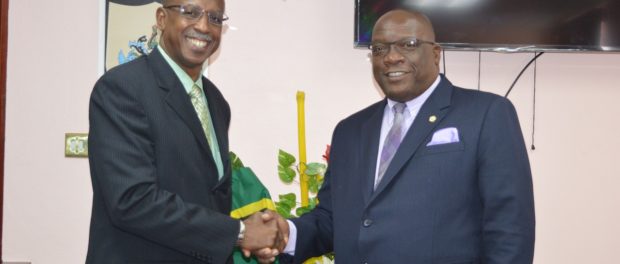TEAM UNITY GOVERNMENT’S APPROACH TO NATIONAL SECURITY RECEIVES HIGH PRAISE FROM NEW RSS EXECUTIVE DIRECTOR
Get our headlines on WHATSAPP: 1) Save +1 (869) 665-9125 to your contact list. 2) Send a WhatsApp message to that number so we can add you
 PM Harris with new RSS Executive Director
PM Harris with new RSS Executive Director
BASSETERRE, ST. KITTS, MARCH 16TH, 2017 (PRESS SEC) — The national security initiatives of Prime Minister Dr. the Honourable Timothy Harris’ administration is receiving high praise from defense experts, such as the newly appointed Executive Director of the Regional Security System (RSS).
Naval Captain Errington Shurland was impressed yesterday, Wednesday, March 15th, 2017, when he heard of the Ministry of National Security’s multi-million-dollar Motorola radio project featuring GPS tracking capabilities and that drones are part of the overall crime reduction strategy in St. Kitts and Nevis.
During a meeting with Commissioner Ian Queeley at the Royal St. Christopher and Nevis Police Force Headquarters on Cayon Street, Captain Shurland – who was supported by his Deputy Executive Director Graham Archer – said: “Brilliant – those are all threading in with the direction that we [the RSS] are taking!”
Indeed, the RSS is increasingly focused on building capacity in technology. For instance, at the last Council of Ministers’ Meeting, it was unanimously decided that a Cyber Investigations Lab should be established.
Defending against cyber attacks is one of the priority areas from the regional perspective, the Executive Director said yesterday in Basseterre ahead of the annual RSS Council of Ministers’ Meeting, which will take place at the St. Kitts Marriott Resort tomorrow, Friday, March 17th. The one-day meeting will be held under the chairmanship of Prime Minister Dr. the Honourable Timothy Harris, who is the current Chairman of the RSS Council of Ministers up until Friday, March 31st.
A news release posted on CARICOM’s website on March 19th, 2016 titled “Caribbean to tackle escalating cybercrime with regional approach” gives the extent of the vulnerabilities that exist in the Caribbean.
“Cybercrimes reported in the region to date have included the theft of US$150 million from the Bank of Nova Scotia in Jamaica in 2014; individuals claiming to be local ISIS supporters hacked government websites in 2015; and, in the same year, tax authorities in the region were infected by ransomware, which blocks users from accessing their systems and demands money,” the release says.
A 2016 report by Cybersecurity Ventures predicts global annual cybercrime costs will grow from $3 trillion in 2015 to $6 trillion annually by 2021. The report states that cybercrime costs include “damage and destruction of data, stolen money, lost productivity, theft of intellectual property, theft of personal and financial data, embezzlement, fraud, post-attack disruption to the normal course of business, forensic investigation, restoration and deletion of hacked data and systems, and reputational harm.”
During yesterday’s meeting, Naval Captain Errington Shurland also commended the Harris administration’s collaborative approach to crime fighting.
The Honourable Prime Minister has said that his Team Unity Government plans to strengthen and expand its collaborative engagement aimed at crime reduction, and the Ministry of Foreign Affairs will play a vital role in advancing the dialogue with regional and international allies.
Yesterday, Wednesday, March 15th, Captain Shurland, the new Executive Director of the RSS, said there is no other way to effectively fight security threats such as cybercrime.
“We are really fighting transnational organized crimes. So it is important that the international partners that have significant interests in the region cooperate and collaborate with the RSS in order to defeat those threats,” the RSS Executive Director said.
The Regional Security System benefits from sustained funding by international partners namely Canada, the European Union, the United Kingdom and the United States.
Examples of such funding follow: the RSS Training Institute was established with funds from the Canadian Government’s Department of Foreign Affairs and International Trade; the EU gave the RSS a 1.2 million EUR grant for the years 2014 to 2017; the UK’s Department for International Development (DfID) funds the recently established RSS Asset Recovery Unit, and the US has given the RSS and its member states over $30 million to develop security programs since the launch of the Caribbean Basin Security Initiative.
Leave a comment
You must be logged in to post a comment.